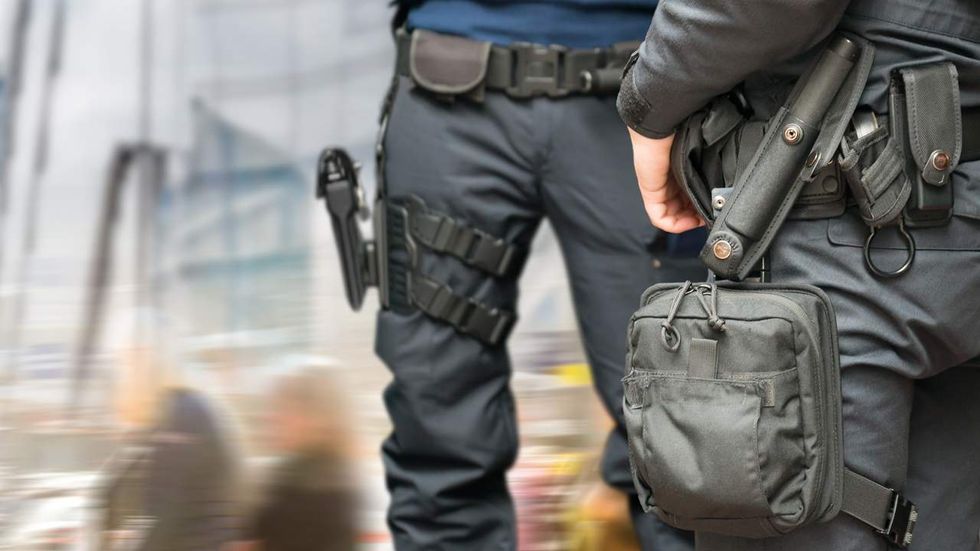
Department of Homeland Security agents are now being stationed overseas. (PinkBadger/Getty Images)

The U.S. Department of Homeland Security is expanding its police force into other countries, a move promoted as a crackdown on drug smuggling, terrorism, and human trafficking.
About 2,000 Homeland Security employees are now stationed in more than 70 nations around the world, including Canada, according to a report by the New York Times. Among them are Immigration and Customs Enforcement special agents and Transportation Security Administration employees. Hundreds of Homeland Security agents are also working aboard Coast Guard ships or flying in surveillance planes over the eastern Pacific Ocean and Caribbean Sea. The agents screen airport passengers and inspect cargo on ships headed for the U.S. They're also training other nations' customs and border officials.
Homeland Security expects to increase its presence in the U.S., as well. The agency wants to hire another 15,000 Immigration and Customs Enforcement border patrol agents for the U.S., a move reportedly brought on by President Donald Trump's war on illegal immigration.
DHS's presence has created tension in some European countries, where leaders believe the U.S. attempting to impose its own immigration laws and procedures. In Germany, for example, lawmakers have said Customs and Border Protection officers are interviewing and investigating travelers at airports before they are allowed to board flights to the United States.
Others say the U.S. agents are simply boosting international security.
“Many threats to the homeland begin overseas, and that’s where we need to be,” James Nealon, DHS assistant secretary for international engagement, told The Times.
In Canada, Homeland Security is beefing up its presence in airports and train stations, where agents have authority to “question, search, and detain Canadian citizens,” the Times reported.
Canadians protested the move with a flurry of letters and emails in August directed at their prime minister’s office. Ralph Goodale, Canada’s public safety minister, told Parliament that American officers would "rarely" question or detain Canadian citizens, the Times reported. Goodale said the partnership helps the two nations reduce threats from "drug smugglers, terrorists and human traffickers."
It does not appear that Canadian officers have the same ability to question or detain U.S. citizens on American soil.
According to the Times, Homeland Security leaders point to multiple examples of success the DHS's work in other nations.
In Nairobi, for example, a training program led to “record seizures of narcotics and other smuggled goods” and has helped secure its borders from militant groups such as the Shabab. Homeland Security special agents stationed at the U.S. Embassy in Pretoria in South Africa have gone after "drug smugglers, wildlife traffickers and Nigerian scammers," the Times reported.
Not everyone agrees with the aggressive approach allegedly used by some agents. In Tanzania, ICE investigators were accused of “using Mafia-style tactics” as they helped extradite alleged drug smuggling suspects to the U.S., according to the Times. Under the operation, agents have been credited with dismantling the network of an alleged international drug kingpin, Ali Khatib Haji Hassan, and two of his alleged associates.
Hassan's alleged operation dealt heroin from Pakistan and Iran and cocaine from South America, the report stated. Some of the drugs were allegedly sold on the streets of American cities and later traced back to Hassan's alleged operation.
The cost of placing ICE agents overseas is being questioned by some lawmakers. A congressional report found that the price tag for stationing an ICE agent overseas is about four times the amount it costs to employ them in the U.S, the Times reported.
The National Treasury Employees Union, in a September report to the House Homeland Security Committee, questioned plans to send more customs officers to work overseas when the U.S. has “critical staffing shortages at the nation’s ports of entry.”
The revelations about DHS' worldwide expansion come at a time when Homeland Security is already under scrutiny for its biometric face-scanning program in select U.S. airports. The DHS is taking pictures of the faces of international travelers bound for certain flights at airports in Atlanta, Boston, Chicago, Las Vegas, Miami, New York City, Houston, and Washington, D.C., for example. The biometric face scans are entered into a DHS database that "flags as many as one in 25 travelers for further scrutiny," according to a report by the Georgetown Law Center on Privacy and Technology.
"If DHS’ current plans are executed, every traveler flying overseas, American and foreign national alike, will soon be subject to a face recognition scan as part of this “biometric exit” program," the Georgetown report states. The system will cost up to $1 billion.
In the past, travelers have complained about pat-down and body-scanning X-rays procedures used by the TSA at airports.